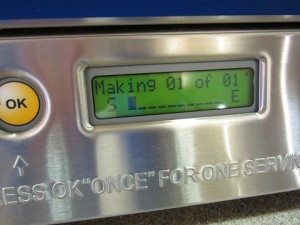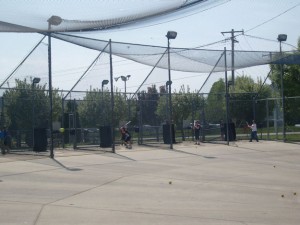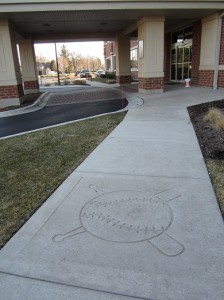If we zone out while driving because we know our route backwards and forwards, we can miss all kinds of interesting sights. For example, the other day I drove under a viaduct and enjoyed an unexpected smile when I spotted a cheerful, rainbow-colored message: Happy B-day KJO
Two words came to mind: celebration and youth. With only a split second to study the artwork, I could only assume it was spelled out with disposable plastic drinking cups. I’d seen those kinds of messages pushed into chain link fences before, but only in white Styrofoam. This was something fresh and new.
The next underpass added more info: Happy B-day Kelli Jo
Without doubt this was the work of high school girls, and as I drove, I pictured a group of them giddily working on the bridge the night before, hurriedly pushing the cups into the fence before they got caught, maybe well after dark.
Some people would call those signs vandalism, or at least littering, both of which are against the law. They might describe them as “messes made by thoughtless youngsters who expect others to clean up after them.” But maybe such thinking is out of place.
Might this be a case for grace?
All of us know people who shine at giving grace to others. They look on the bright side of each situation and hunt for reasons to be thankful. We feel at ease around them, knowing these grace-based people are also non-judgmental. We’re free to be ourselves and can rest easy in the relationship, despite our failures and flaws.
And this is exactly how Jesus wants us to perceive him, as a grace-based Person. When we fall short of his high standards and failure hounds us, he immediately looks on the bright side, hoping we’ll do better next time. He also hunts for ways to hearten us when we’re disheartened and in the process looks for reasons to be thankful for us (hard to believe, but true). Although he’s also the ultimate Judge and has the power to act on all of his justice-based opinions, he often clears us instead, eliminating the blame and shame we deserve.
And he does it by his grace.
My name isn’t Kelli Jo, and it wasn’t my birthday the other day, but seeing those signs put a little sparkle into a boring expressway drive. And by the way, the accurate definition of vandalism is “deliberately malicious destruction or damage of property,” which this wasn’t. And the definition of littering is “rubbish strewn or scattered about,” which this wasn’t either.
Kelli Jo can continue to take pleasure in her birthday greetings… as long as she eventually climbs up on the bridge and collects all 264 of those pretty colored cups.
“From [Jesus Christ’s] abundance, we have all received one gracious blessing after another.” (John 1:16)






